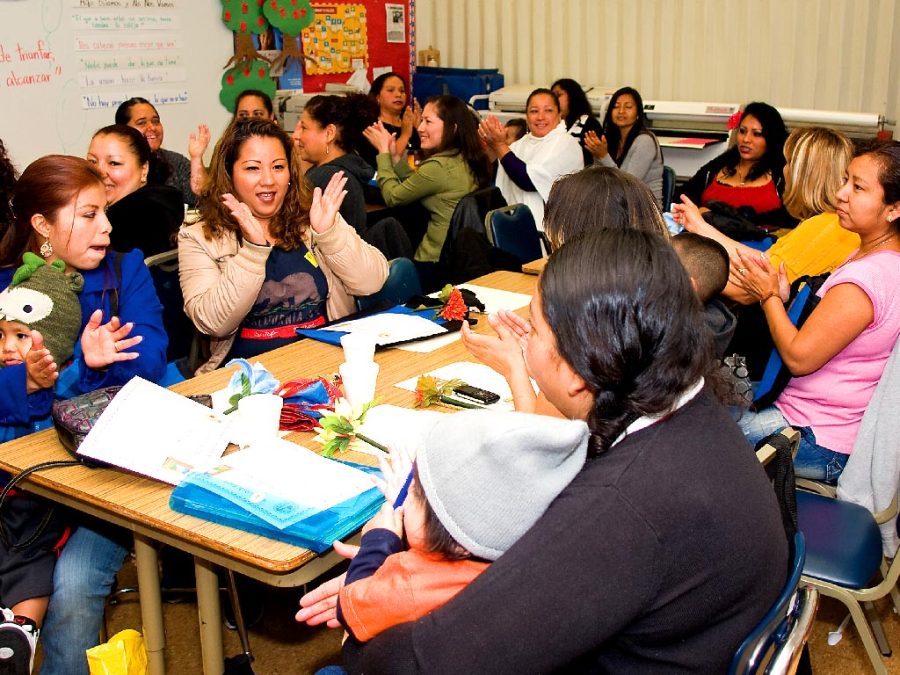WCHS community strives to reach more public engagement
The new MCPS public engagement policy emphasizes the importance of culturally responsive and anti racist engagement. In addition to the policy, the BOE has released tools to ensure communication is effective for a diverse parent community.
December 2, 2022
On Oct.19, WCHS students were asked to complete a wellness survey during Pride. The survey asked for suggestions and feedback regarding the wellness time provided after second period every day. Despite the school’s insistence that “[everybody’s] input is important,” WCHS sophomore Eva Lee, along with 50% of the school according to an email sent out by the school administration, opted not to fill out the survey.
“While I normally think that every vote counts, it feels as though the school and ultimately the county doesn’t really listen to our opinions,” Lee said. “For example, last year most people didn’t want Pride and yet this year they extended it by not only having it once a week but also having wellness time every day.”
Community engagement, the involvement of community members in decision making, has been lacking at both school and county-wide levels in recent years. In March 2022, the MCPS Board of Education (BOE) approved an updated draft of the Board Policy titled “Community Involvement.”
The draft aims to update guidelines and practices for engagement related to Board decisions and to change the policy’s title to “Community Engagement.” It was up for public comment, meaning anyone could comment on the tentative policy until Nov. 4. Now that the public comment period has ended, the BOE will take it into account and soon release the finalized version of the policy.
“A large and diverse system like MCPS cannot effectively make decisions, write policy, and develop practices without the input and collaboration of all its diverse stakeholders,” John Landesman, the executive director of the Office of Strategic Initiatives, said when the policy was presented at a BOE meeting on March 24, 2022. “As you read the draft, you will recognize that this is not merely a modification of the current version. Our belief is that the original policy contributes to a lack of engagement.”
The amendments to the policy emphasize the importance of culturally responsive engagement, highlighting the involvement of all community members, regardless of race, religion or socioeconomic status. The policy prioritizes the engagement of all families by ensuring that the county and schools have “varied opportunities for the community to raise its aspirations, concerns, and analysis of issues facing MCPS,” as stated in the policy. One way this is evident is when organizing engagement activities and opportunities, practitioners are required to be mindful of certain things such as “who needs to be involved to make the most effective decision.”
“As we implement this policy, [it is important to note that there] is no one way to engage. Every time we engage it should be multifactored in terms of how we do that to get it to all of these communities,” MCPS Superintendent Dr. Monifa McKnight said during the presentation meeting on March 24. “The timing of this policy is perfect because when we think about framing the work of an anti-racist system, this is the start of it. And with the policy directing that, it marries up the opportunity for us to do it.”
Recently, MCPS has been taking many steps to ensure the school system is anti-racist and offers all students the same opportunities and resources. However, without an effective public engagement policy, the county can’t implement successful policies and programs. It is imperative for the BOE to know precisely what the community wants and needs as well as how their policies work when put into practice.
“The school and county need to run as a partnership between the home and the school,” WCHS parent Natalie Billington said. “One does not work without the other. It is a partnership, which doesn’t mean that the parent or student body has the strongest voice – we are not the school system – but it is important that we have a voice. It works in everybody’s favor if everyone is on the same page.”
MCPS recently released the results of an anti-racism audit that was conducted at the end of the last school year. The BOE’s goal is that the audit and new public engagement policy will work in tandem in order to move the school system forward.
“We just released the [results of the] anti-racism audit and the next step of that process is that the administration, the superintendent and her team, will come back to the board with an action plan as to how they are going to implement the recommendations from the anti racism audit because we can’t do it all at once,” BOE member Dr. Scott Joftus said. “So, we are going to prioritize the recommendations and embed that as part of our ongoing public engagement strategies and efforts. The idea is that [the anti-racism audit and new public engagement policy] will work together.”
The COVID-19 pandemic additionally created a larger barrier for students and families to be heard by their respective schools and by MCPS at large. MCPS is hoping to change this narrative through the Community Engagement Policy.
“There is a lot of evidence that suggests that parents and other community members have sort of lost their trust in MCPS during the pandemic, so I know there is a renewed focus on the part of the board and administration to address that as meaningfully as we can,” Joftus said. “So, as a board, we identified four priorities for this year and our number one priority is to rebuild the trust and authentically engage families and community members. It’s all for the purpose of helping the students to succeed.”
In the upcoming weeks, the BOE will release the finalized version of the Community Engagement policy and numerous other policies regarding anti-racism and the system at large. It is important for all community members, whether students, teachers, parents or others, to be aware of both their school and the BOE’s actions and to be confident that their voices will be heard.
“At the end of the day, we the parents and students, are not the school system. We don’t make the decisions, and that’s okay,” Billington said. “But it is so important that the people working in the system know how their actions and decisions are impacting the very people who they are serving. Without a proper community engagement policy, how can you move the schools in a direction that is better for everyone?”



